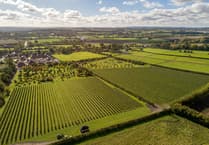THE UK is facing its largest outbreak of bird flu with more than 60 cases confirmed across the country since the start of November.
By comparison, there were 26 outbreaks last winter.
But since November, there have been a record number of outbreaks in the Midlands, in Wales, and on Wednesday, December 22, the first outbreak in Devon was recorded.
Birds on infected premises are humanely culled, and a 3km protection zone and 10km surveillance zone is put in place around infected premises.
This leaves the south east, including Hampshire, as the only region so far not to have recorded any cases or outbreaks.
To help mitigate the spread of disease, the government introduced new avian housing measures last month (November).
This means those who keep chickens, ducks, geese or any other birds are now legally required to keep them indoors and to follow strict biosecurity measures.
Wild birds migrating to the UK from mainland Europe during the winter months spread the disease so it is vital to not allow wild birds to mix with chickens, ducks, geese or other birds.
A spokesman for the government’s Animal and Plant Health Agency (APHA) said: "We would usually expect to see the first cases in late autumn with the peak risk occurring between December and February.
"But this year, the first case was confirmed even earlier at the end of October.
"Subsequently, to date, we have confirmed infection in more than 320 wild birds from across the GB.
"It appears the timing and scale of this event in wild birds is earlier and on a greater scale than previous years.
"This higher risk for infection of poultry as a result has translated into the large number of cases."
And bird flu can cross-infect to other species of wildlife, which can spread it.
People can also spread it on their clothes and shoes so before going into bird enclosures people are encouraged to wash their hands, and change or clean and disinfect footwear.
The UK Health Security Agency has confirmed that the risk to public health is low.
Humans can catch bird flu, but this very rare; the last recorded human infection was in October in Laos, in south-east Asia.
And the Food Standards Agency said bird flu poses a very low food-safety risk and doesn’t affect poultry or eggs.
The UK’s chief veterinary officer Christine Middlemiss (pictured below) is reminding poultry keepers to follow the new measures.
She added that while the main source of infection comes from migratory wild birds, people who don’t implement these measures risk infecting their own flocks by walking the virus into their holdings.
The former Department for Food and Rural Affairs (Defra) scientist said: "We have taken swift action to limit the spread, including introducing housing measures.
"But we are seeing a growing number of cases in commercial farms and in backyard birds across the country.
"Many poultry keepers have excellent biosecurity standards but the number of cases we are seeing suggests not enough is being done.
"Whether you keep just a few birds or thousands, you must take action now to protect your birds from this highly infectious disease.
"Implementing scrupulous biosecurity has never been more critical.
"You must regularly clean and disinfect your footwear and clothes before entering enclosures, stop your birds mixing with any wild birds and only allow visitors who are strictly necessary.
"It is your actions that will help keep your birds safe."
For more information visit the Defra website at https://www.gov.uk/guidance/avian-influenza-bird-flu




